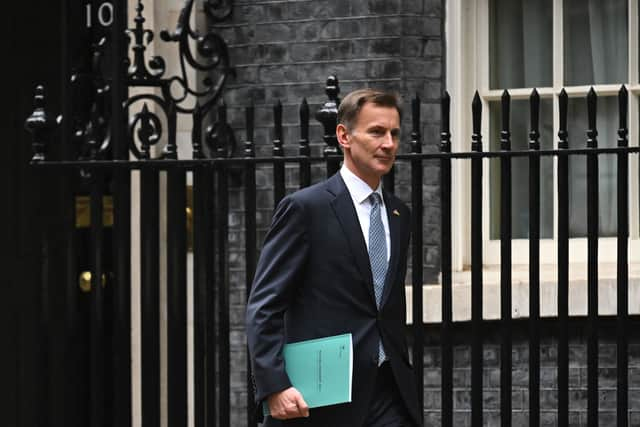What is a windfall tax? What did Jeremy Hunt announce in his autumn statement - will it help cost of living
and live on Freeview channel 276
Chancellor Jeremy Hunt has announced, in his first autumn statement, that UK wind farms will pay a higher windfall tax than oil and gas rigs operating nearby as the government will levy an extra 45% charge on their profits.
He will also increase the oil and gas windfall tax from 25% to 35% from the start of next year, and plans to introduce a brand new windfall tax on electricity generators.
Advertisement
Hide AdAdvertisement
Hide AdHe hopes the taxes will raise around £14 billion for the Treasury between them next year.
The move follows months of pressure from Labour for ministers to raise more money from oil and gas giants.
Here we explain what the windfall tax is, what Jeremy Hunt announced in the House of Commons, and how it could help ease soaring energy bills.


What is a windfall tax?
A windfall tax is a one-off levy imposed by the government on a company or group of businesses that have unexpectedly benefited from something outside of their control - in this case a surge in oil and gas prices.
Advertisement
Hide AdAdvertisement
Hide AdThe government has imposed windfall taxes on industries before. For example, in 1997, the Labour chancellor Gordon Brown raised £5.2 billion from a windfall tax on privatised utilities.
Oil and gas prices have soared over the past year, notably since Russia’s invasion of Ukraine. This has triggered calls for companies in the sector to be taxed on their outsized profits.
Labour originally argued that a one-off, year-long windfall levy could raise £1.2 billion to fund discounts on home energy bills.
What did Jeremy Hunt say about the tax?
He told the Commons on Thursday (17 November): “I have no objection to windfall taxes if they are genuinely about windfall profits caused by unexpected increases in energy prices. But any such tax should be temporary, not deter investment and recognise the cyclical nature of many energy businesses.
Advertisement
Hide AdAdvertisement
Hide Ad“The structure of our energy market also creates windfall profits for low-carbon electricity generation.”
He added: “Cheap, low carbon, reliable energy must sit at the heart of any modern economy. But Putin’s weaponisation of international gas prices has helped drive up the cost of our national energy consumption. This year we will be spending an extra £150 billion on energy compared to pre-pandemic levels, equivalent to paying for an entire second NHS through our energy bills.”
“Over the long term, there is only one way to stop ourselves being at the mercy of international gas prices: energy independence combined with energy efficiency. Energy independence, so neither Putin or anyone else can use energy to blackmail us, and energy efficiency to reduce demand and climate impact as much as possible.”
Could it help with cost of living?
The idea of the tax is that the money raised could be spent on easing the cost of living crisis for those households most under pressure.
Advertisement
Hide AdAdvertisement
Hide AdLabour had repeatedly argued that a one-off year-long windfall levy could raise £1.2 billion to fund discounts on home energy bills.
The party proposed levying an extra 10% on the corporation tax paid by oil companies that are active in the North Sea.
This would not only affect well-known firms such as BP and Shell but also lesser-known ones such as Harbour Energy – which actually produces more oil from the North Sea than any other extractor.
What have opposition parties said?
Shadow chancellor Rachel Reeves said: “After months of resistance, including from this Prime Minister, the government has finally been dragged kicking and screaming to extend the windfall tax that Labour first called for in January. The government has announced plans for energy bills next year, but bill-payers will still see them go up next spring, leaving far too many people wondering how they’ll make ends meet.
Advertisement
Hide AdAdvertisement
Hide Ad“For every pound of windfall tax left on the table, working people are forced to pay the price.”
Reeves accused the government of still leaving “billions of pounds on the table”.
She added: “Because they have failed to close a huge loophole that they created that hands out massive tax breaks to those oil and gas giants for doing the things that they were going to do anyway.”
Meanwhile, Green MP Caroline Lucas welcomed the higher energy windfall tax but said it was “scandalous” that the chancellor was “keeping the investment allowance, giving a massive subsidy to obscenely wealthy oil and gas companies”.
Comment Guidelines
National World encourages reader discussion on our stories. User feedback, insights and back-and-forth exchanges add a rich layer of context to reporting. Please review our Community Guidelines before commenting.
